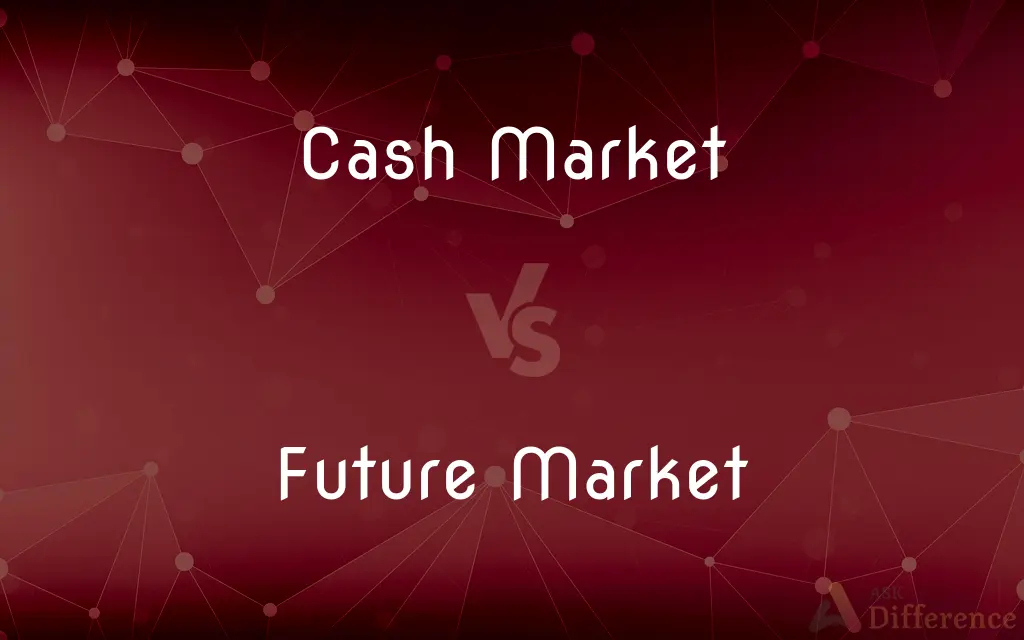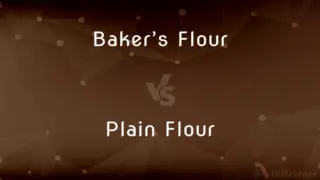Cash Market vs. Future Market — What's the Difference?
By Tayyaba Rehman — Published on November 29, 2023
The Cash Market involves immediate buying and selling of assets, whereas the Future Market deals with contracts to buy/sell assets at a future date and set price.

Difference Between Cash Market and Future Market
Table of Contents
ADVERTISEMENT
Key Differences
The Cash Market, sometimes referred to as the "spot market," is where financial instruments or commodities are traded for immediate delivery. When a transaction occurs in this market, the payment and delivery of the asset or commodity take place instantly or within a short timeframe. This immediacy distinguishes the Cash Market from other financial markets.
In contrast, the Future Market is where participants enter contracts to buy or sell an asset at a predetermined price on a specified future date. The key element here is that the actual exchange of the asset does not occur immediately. Instead, it's based on a future date specified in the contract.
Assets traded in the Cash Market are for current values, meaning the prices reflect the real-time or "spot" value of the asset. When an investor buys a stock in the Cash Market, they're purchasing it at its current market price and will own it outright after the transaction.
On the other hand, the Future Market doesn't involve the immediate exchange of assets. Rather, it's about the agreement to conduct a transaction in the future. Prices in this market represent anticipated future values, often involving speculation about how the asset's price will move by the contract's end date.
In essence, while the Cash Market concerns itself with present transactions and immediate deliveries, the Future Market revolves around contracts that dictate terms for a future exchange, often serving hedging or speculative purposes.
ADVERTISEMENT
Comparison Chart
Transaction Timing
Immediate
Set for a future date
Purpose
Immediate purchase/sale of assets
Speculation, hedging
Pricing
Current or "spot" prices
Based on anticipated future values
Delivery
Immediate or within a short timeframe
On a specified future date
Contractual Obligation
None
Obligated to buy/sell at agreed terms
Compare with Definitions
Cash Market
A trading platform dealing with real-time or "spot" prices.
Gold prices in the Cash Market today have surged due to geopolitical tensions.
Future Market
An exchange emphasizing speculation and hedging.
The Future Market allows traders to bet on oil prices months in advance.
Cash Market
A market where financial instruments are bought and sold for immediate delivery.
He bought shares in the Cash Market and received them in his account the next day.
Future Market
A market where contracts are made for future asset delivery at a set price.
Many agricultural producers use the Future Market to lock in prices for their crops.
Cash Market
A segment of the financial market emphasizing present transactions.
Investors often turn to the Cash Market for direct asset ownership.
Future Market
A platform where anticipated future values determine asset prices.
He speculated in the Future Market, expecting gold prices to rise next month.
Cash Market
An exchange without future obligations post-transaction.
Unlike futures, transactions in the Cash Market don't bind you to future commitments.
Future Market
A segment of finance dealing with contractual obligations for future transactions.
The Future Market gives manufacturers a way to manage price risks.
Cash Market
The immediate physical or electronic exchange of assets upon payment.
She preferred the Cash Market for its straightforwardness and immediacy.
Future Market
An environment where contracts, not actual assets, are the primary trade items.
She didn't own any barrels of oil directly, just contracts from the Future Market.
Common Curiosities
How are Artifacts different from Fossils?
Artifacts are man-made objects from past cultures, while Fossils are naturally occurring ancient remains.
What materials commonly make up Artifacts?
Artifacts can be made of stone, pottery, metal, bone, and other materials used by past civilizations.
Can Fossils be found everywhere?
While Fossils can be found in many places, certain regions with specific geological conditions are more fossil-rich.
Are all old objects considered Artifacts?
Not necessarily; Artifacts specifically pertain to items made or used by humans and hold historical or archaeological significance.
Can plants become Fossils?
Yes, plants can leave Fossils, often in the form of imprints or preserved organic material.
What are Fossils?
Fossils are preserved remains or traces of ancient organisms.
Why are Artifacts important?
Artifacts provide valuable insights into the behaviors, technologies, and cultures of past human societies.
How are Fossils formed?
Fossils typically form when organisms are buried quickly by sediment and then undergo mineralization over time.
Are contemporary objects ever labeled as Artifacts?
While "Artifact" typically refers to ancient items, in some contexts, more recent culturally significant objects might be termed "contemporary Artifacts."
How do scientists date Fossils?
Scientists often use radiometric dating methods, among other techniques, to determine the age of Fossils.
Share Your Discovery

Previous Comparison
Baker’s Flour vs. Plain Flour
Next Comparison
Free Size vs. One SizeAuthor Spotlight
Written by
Tayyaba RehmanTayyaba Rehman is a distinguished writer, currently serving as a primary contributor to askdifference.com. As a researcher in semantics and etymology, Tayyaba's passion for the complexity of languages and their distinctions has found a perfect home on the platform. Tayyaba delves into the intricacies of language, distinguishing between commonly confused words and phrases, thereby providing clarity for readers worldwide.
















































